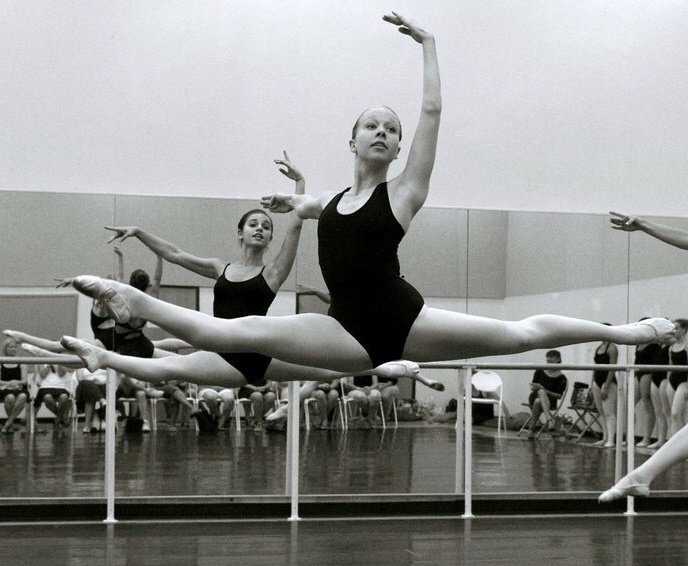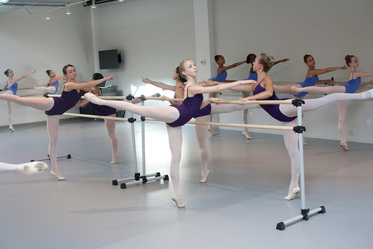 NJDTE Level 5 dancers in ballet class. Photo by Tony Turner.
NJDTE Level 5 dancers in ballet class. Photo by Tony Turner. At the toll of the last school bell and the first glimpse of the shining sun, a new season arrives, signaling the start of adventures with friends and the time to try new things. For most, this would mean summer vacation. For all of you dancers out there, you know it can only mean one thing: SUMMER INTENSIVE SEASON! While you are undoubtedly awaiting the moment you can finally revisit those old friendships, create new bonds, work with world-class faculty, and spend hours in the studio doing what you love, you might also be feeling overwhelmed by all of the things you have yet to experience: different dance styles, new choreography, and uncharted levels of intensity. Not to fear! This is your NJDTE Summer Intensive SUCCESS Guide. We’ve compiled a list of tips from dancers who have gone through the process and faculty who are experts in the field to support you during this important time for growth and development.
Part I tackles physical preparation and care to keep you healthy and injury-free throughout your training, so you can smoothly transition into the summer intensive season:
Rest up
Your year-long training season has come to a close, school is out, and you can’t wait to use up every minute of your free time with friends and family before heading off to a summer program. Hey, its summer vacation! In the midst of all of that fun, though, don’t forget to set aside some of those hours for some much-needed sleep! Solidifying a consistent sleep schedule will help to get your body back into a routine for your program. The more rested you are at the start of the program, and the more diligent you are about getting some shut-eye, the more you’ll be able to take advantage of every moment in the weeks to follow.
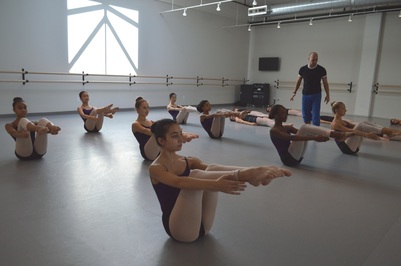 NJDTE Level 4 dancers in Horton class with faculty member Bradley Shelver.
NJDTE Level 4 dancers in Horton class with faculty member Bradley Shelver. While rest is incredibly important, keeping your body moving during your break between the regular season and a summer course is equally necessary. At the start of summer, don’t be afraid to take a bit of a break. Allow your muscles the opportunity to relax and recuperate from working so hard all year. But, there is a fine line between resting and regressing. Your body should still be in conditioned form when you embark on an intense course load to avoid unwanted soreness, fatigue and injury.
Begin by taking classes regularly in the weeks leading up to your summer program. Incorporate extra cardio to pump up your stamina (crucial during a long day of classes and rehearsals), as well as strength and flexibility training. Summer is the perfect time to take advantage of the many benefits of swimming: the pool provides a low-impact environment in which you can experience a full-body workout, along with a healthy dose of heart-pumping cardio.
NJDTE & Juilliard School alumna Magdalyn Segale suggests GYROTONIC© and yoga to open the body and promote mobility, while fellow NJDTE alumna & Marymount Manhattan College BFA student Nicole Killmer looks to Pilates to engage her core and foster stability for her classes. Remember, everyone’s body is different, with a different set of needs. Experiment with what makes you feel good, and use that to help prepare you for the work you’ll need to do later on.
Settle in and create a comfortable, prepared environment
You are bound to experience many new and wonderful challenges throughout the duration of your program. Be sure to feel out your surroundings and settle in so you’re prepared to work well each day.
- Keep your belongings organized for easy access in between classes. This way, you wont be frantically searching for your back-up pair of ballet shoes if your usual ones are damaged during class.
- Work out a personal schedule so that you can fit in everything you need to during the day: use the restroom, change into a fresh leotard, grab a quick snack, etc.
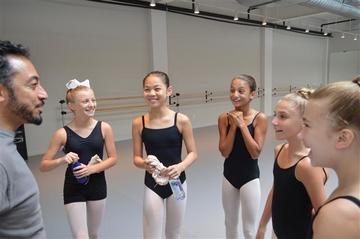 NJDTE Summer faculty member Juan Carlos Penuela shares a moment with Ruby Level dancers after class.
NJDTE Summer faculty member Juan Carlos Penuela shares a moment with Ruby Level dancers after class. The constant movement of a busy summer course makes it seem as though free time is few and far between. Don’t be fooled! Some of the most valuable bits of time are actually pre- and post-class.
Before Class:
While getting up that extra half an hour early might seem like a challenge, especially when you are tired after a long day before, carving out a moment before your first class of the day to get organized and properly warmed up is essential to getting the most out of your summer. NJDTE Summer ballet faculty member Lenore Pavlakos-Morales stresses the importance of being physically prepared for each class:
“Thinking you will warm-up during the beginning of the class is a missed opportunity to get better. Your lessons present exercises that prepare you for the center combinations. If warm, you can fully take advantage of improving your technique during the structured warm-up.”
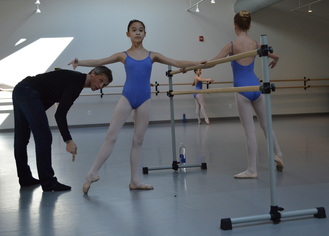 NJDTE Summer faculty member Peter Brandenhoff in class with Level 3 dancers.
NJDTE Summer faculty member Peter Brandenhoff in class with Level 3 dancers. After Class:
The same moment of “you time” can be found immediately after class. Between classes, consider trading the time to check your phone for an opportunity to check in with your body. At the peak of your exhaustion, after a full class, stretch out and lengthen your muscles. There is no better time to do so than when you are this warm. Roll out, sit, breathe, decompress. Perhaps jot down some notes from class. At the end of the day, you’ll be glad you took the time to care for your body and strengthen your focus.
If you remember one thing and one thing only, it is this: No matter how diligent you are about keeping with the rest of these tips and tricks, you will not get the most out of your summer program if you are not properly fueled and functioning at your highest capacity. A body without proper food is like a car without proper fuel.
Be sure to stay hydrated throughout your program. If you think you are hydrated enough, drink more water. In the heat of the summer, sweating it out in a studio, your body will always benefit from a boost of H2O.
When you feel low on energy, reach for whole fruits and vegetables, or even protein bars (portable, and perfect for putting in your dance bag). Bananas, baby carrots, and sliced apples with nut butter are all handy, quick to eat, and dependable as well. However, always be mindful of your program’s allergy restrictions and guidelines.
Check out Part II of this Summer Intensive SUCCESS Guide, which covers mental preparation, focus, and tips for tackling corrections and challenging repertoire!
